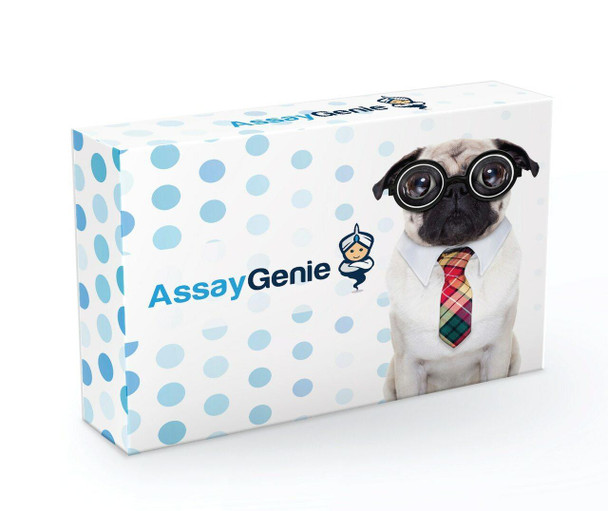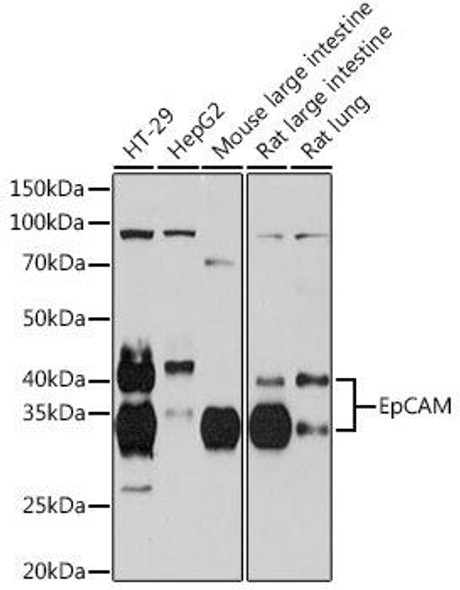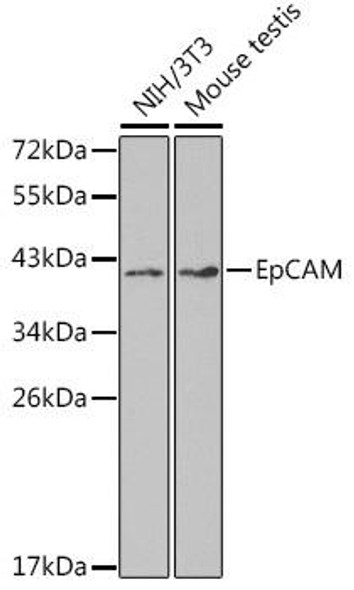Description
EPCAM Monoclonal Antibody [PAT36F10AT] (CPAB0608)
The EpCAM Polyclonal Antibody (CPAB0608) is specifically designed for researchers studying EpCAM, a cell surface glycoprotein that is commonly used as a marker for epithelial cells in various tissues. This antibody, produced in rabbits, is highly reactive with human samples and has been validated for use in applications such as immunofluorescence and flow cytometry.EpCAM, also known as CD326, plays a critical role in processes such as cell adhesion, proliferation, and migration, making it a valuable target for cancer research and stem cell studies.
This antibody binds specifically to the EpCAM protein, enabling precise detection and analysis in different cell types, providing valuable insights into EpCAM's function in various biological processes.Researchers interested in studying EpCAM in the context of cancer biology, stem cell biology, or tissue regeneration will find the EpCAM Polyclonal Antibody (CPAB0608) to be a valuable tool for their experiments. Its high specificity and reactivity with human samples make it a reliable choice for advancing research in these fields.
| Product Name: | EPCAM Antibody |
| Product Sku: | CPAB0608 |
| Size: | 5μg |
| Host Species: | Mouse |
| Immunogen: | Anti-human EPCAM mAb, clone PAT37F9AT, is derived from hybridization of mouse F myeloma cells with spleen cells from BALB/c mice immunized with a recombinant human EPCAM protein 24-265 amino acids purified from Ecoli. |
| Clone: | PAT36F10AT. |
| Reactivity: | Other bodies |
| Applications: | Western Blot, ELISA |
| Purification Method: | EPCAM antibody was purified from mouse ascitic fluids by protein-A affinity chromatography. |
| Isotype: | IgG1 |
| Background: | EPCAM is a carcinoma-associated antigen and belongs to a family which includes at least 2 type I membrane proteins. The EPCAM protein has a role in embryonic stem cells proliferation and differentiation. EPCAM is used as a target for immunotherapy treatment of human carcinomas. EPCAM is expressed on most normal epithelial cells and gastrointestinal carcinomas and acts as a homotypic calcium-independent cell adhesion molecule. Epithelial cell adhesion molecules (EPCAM) can act as a physical homophilic interaction molecule between intestinal epithelial cells (IECs) and intraepithelial lymphocytes (IELs) at the mucosal epithelium for supplying immunological barrier as a first line of defense against mucosal infection. EPCAM gene mutations result in congenital tufting enteropathy. |
| Synonyms: | Epithelial cell adhesion molecule, Ep-CAM, Adenocarcinoma-associated antigen, Cell surface glycoprotein Trop-1, Epithelial cell surface antigen, Epithelial glycoprotein, EGP, Epithelial glycoprotein 314, EGP314, hEGP314, KS 1/4 antigen, KSA, Major gastrointestinal tumor-associated protein GA733-2, Tumor-associated calcium signal transducer 1, CD326, EPCAM, GA733-2, M1S2, M4S1, MIC18, TACSTD1, TROP1, ESA, MK-1, DIAR5, EGP-2, EGP40, KS1/4, HNPCC8. |
| Storage Buffer: | For periods up to 1 month store at 4°C, for longer periods of time, store at -20°C. Prevent freeze thaw cycles. |







